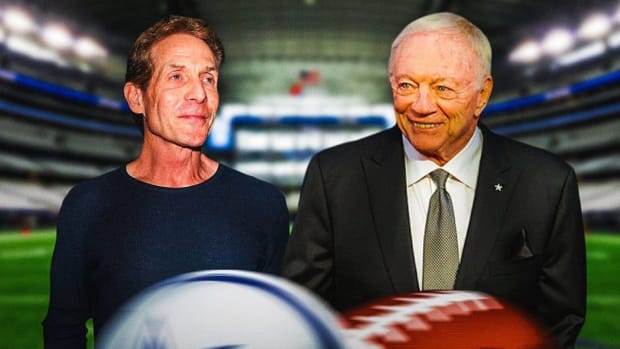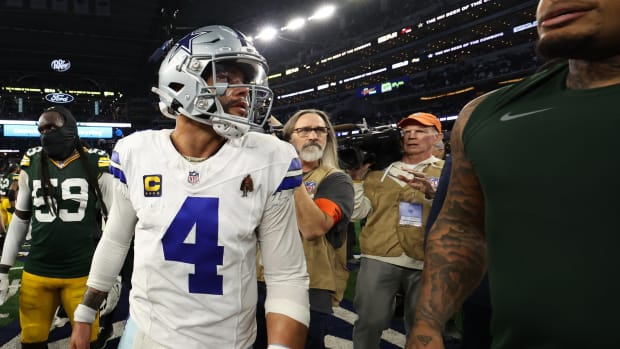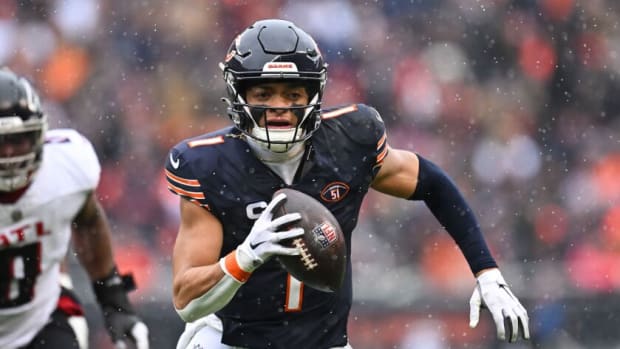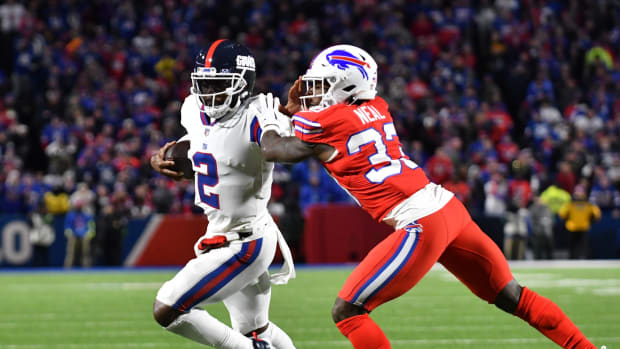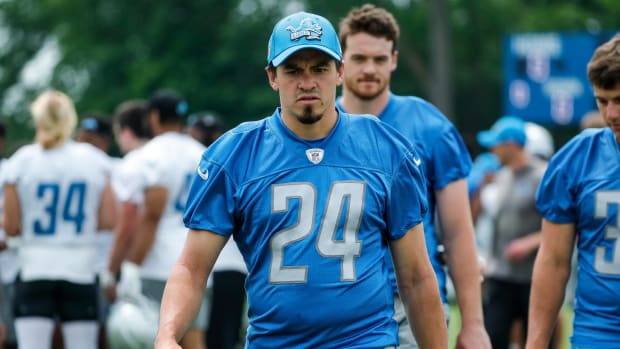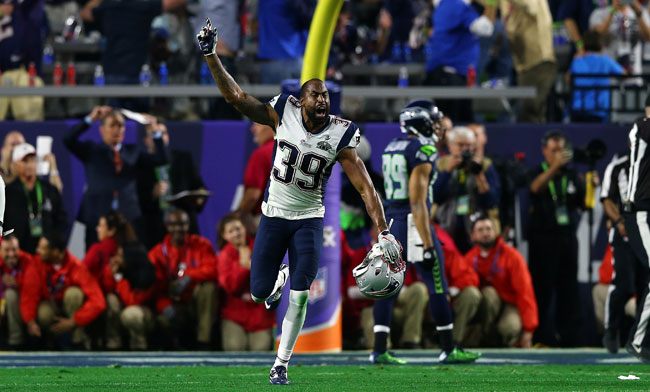
What It Takes To Build a Super Bowl Contender
1. I think the smartest thing I heard all training camp about fighting in practice came from George Iloka, the Bengals’ rising star at strong safety who infamously broke his hand in a practice fight that was featured on Hard Knocks in 2013. The fifth-round pick was in a three-way competition for the safety job in his second season with Shawn Williams and Taylor Mays when he got into it with Jordan Campbell during a special-teams drill.
“I had a slight edge in the safety competition,” Iloka says. “Then I got into the fight, and I punched him with a closed fist in the helmet three times, and broke my hand on the third swing.
“Your window of opportunity is so small, and I broke my hand. Now I’m watching practice from the bench. Coach [Marvin] Lewis came up to me one day, and he was like, ‘Do you know who Wally Pipp is?’ ”
“No,” Iloka said.
“Exactly,” Lewis replied. “He started at first base for the Yankees for 10 years. He got hurt one day, and they put in a kid named Lou Gehrig, and you never heard of Wally Pipp again.”
Says Iloka: “That stuck with me. It made me feel like I just f----- up my only opportunity. I came back and ended up starting the whole year and had a better third season last year. Now they use me as an example for rookies, and I’m cool with that. I’m not even a fighter, but I broke my hand on a helmet like an idiot.”
2. I think the second smartest thing I heard all training camp also came from George Iloka, who put Bengals quarterback Andy Dalton’s playoff struggles in context. While Dalton carries a 57.8 passer rating in four playoff appearances—all losses—the Bengals have given up an average of 390 yards per loss and produced just two turnovers.
“Our playoff losses have been team losses, not on one particular person,” Iloka says. “There’s no, I lost or he lost. We all lost. We all left unhappy, and nobody got a Super Bowl ring. When we got to the playoffs, nobody took their game to the next level. It’s a new season, so we’ve got to get there first and foremost, and then when we get there, try to right our wrongs.”
3. I think what I tweeted yesterday is my comment on the Cris Carter issue.
4. I think when Eric Berry and his friends are ready tell his story in full, it’s going to be an incredible one. The details so far are special. There were numerous visits over the months Berry was undergoing chemotherapy, from Clark Hunt and general manager John Dorsey and coach Andy Reid and PR Boss Ted Crews. Reid and Crews visited Berry’s home in June. “He was a ball of energy. He was up and moving. He looked good, but he didn’t have a lot of hair,” Reid says. “In the beginning, I really didn’t think about whether he could come back and play. All of your hope and energy is on whether he can beat this. You just want him to have a life. Then you look at him and you say, Wow, he’s actually within striking distance to play again.” What a story, and what a life Berry’s led in 26 years. He’s the unquestioned leader of this Chiefs team, at one point the highest-paid safety in NFL history, and now, a cancer survivor.
THE MMQB PODCAST WITH ROBERT KLEMKO & ANDY BENOIT
5. I think Lions safety Glover Quin got an unnecessary amount of flak for this comment on Jordy Nelson’s injury: “I hated Jordy got hurt, but in my beliefs, and the way I believe, it was—God meant for Jordy to get hurt. So if he wouldn’t have got hurt today, if he wouldn’t have played in that game, if he wouldn’t have practiced anymore, and the next time he walked on the field would have been opening day, I feel like he would have got hurt opening day.”
I've heard a similar sentiment several times from players, who feel there’s nothing you can do to avoid injury; when it's your time, it's your time. It's as though an ACL or a shoulder labrum is a ticking time bomb, and at some point it's going to go off. This is how a lot of spiritual players cope with the uncertainty of life in the NFL. They accept injury as something they cannot reasonably avoid, and that expectation helps them cope and recover when the inevitable arrives, rather than dwelling on what might have been if, say, there were two fewer preseason games.
6. I think I’m always fascinated with how players arrive at decisions in free agency. There are always unapparent motivations and circumstances, and Brian Orakpo’s story is no different. The new Titans outside linebacker at one time fancied himself a lifetime Washington guy, but suffered three pectoral tears in three seasons. A Pro Bowl shoo-in when healthy, Orakpo signed a four-year deal worth up to $32 million to be a Titan. The Cardinals would have been Orakpo’s next stop had negotiations in Tennessee fallen apart. Orakpo was kind enough to list his reasons this month.
“I wanted to go somewhere where there were people I knew, in terms of coaches or players. Free agency is a weird process. I definitely considered going back to Washington if we could work something out. [Former Texas teammate] Michael Griffin was here in Nashville, so I just hung out with Griff. We had something on the table, but the language of the contract wasn’t right. So I just stayed around, kicked it with Griff, went to his daughter’s karate class. Before I made the decision, I met Dick LeBeau, and I’d never met him, but with our defensive coordinator [Jim] Haslett in Washington, we would study LeBeau’s 3-4 defenses all the time. So when he came here I knew it would be a good fit.”
I was pleasantly surprised to hear what Orakpo said next, concerning his breakup with Washington's team and a team owner often described as both petty and petulant. “Once I signed here, Dan Snyder and Bruce Allen and I had conversations," Orakpo says. "I left on good terms. They wanted me to be the guy and I couldn’t stay healthy for those guys. I thought to myself, It wasn’t fair to those guys to have put so many eggs in my basket and I couldn’t deliver. I felt it was best to start a new chapter. They said they loved me and they wished it had worked out. I wished them well.”
7. I think Saints cornerback Brandon Browner was spot-on when he told me the three most important factors to forming a Super Bowl team. (He had been a member of two different Super Bowl-winning franchises—the Seahawks and Patriots—in two consecutive years.)
A. “Togetherness. You have to throw away the egos. The Seattle team had characters, with your Richard Shermans and whatnot. But those egos and characters have to come together as one on Sunday.”
B. “Smarts. You have to completely do away with dumb penalties and similar things that hurt the team. That starts in camp. You create the atmosphere early and rehearse everything in practice so when game time comes it comes naturally.”
C. “The quarterback. I’ve been blessed to play with some of the best in the game, and we have that here with Drew Brees.”
8. I think the non-quarterback rookie with the most weight on his shoulders in all of football is Devin Funchess, the Panthers wideout who was once a tight end in college. Funchess had the enviable position of joining No. 1 receiver Kelvin Benjamin in Carolina’s receiving corps, which looked adequate for the first time in years. But after Benjamin tore his ACL last week, the 21-year-old second-round pick out of Michigan has become the de facto No. 1, even if Panthers coaches won’t call him that just yet. Here’s what offensive coordinator Mike Shula told me about Funchess before Benjamin went down, when I asked about the decision to teach Funchess the X, F and Z receiver positions all at once: “We found out he’s a pretty fast learner. Now it’s just a matter of getting the reps and him learning all the adjustments he has to make with all the routes vs. all the different looks.” Reps, no doubt, will be in abundance.
• BENOIT’S DEEP DIVE: Rex Ryan Has Found the Next Revis*
9. I think the best thing the Whaley-Marrone-Schwartz combo did before Marrone bailed on the Bills was trade for former Colts first-rounder Jerry Hughes in 2013. Hughes was entering his fourth NFL season when Indianapolis drafted Bjoern Werner, a pass rusher out of FSU. Whaley worked out a deal that sent linebacker Kelvin Sheppard to the Colts for Hughes, who had five sacks in seven starts over three seasons behind Dwight Freeney and Robert Mathis. Werner has 6.5 sacks in two seasons; Sheppard lasted one season in Indy; and Hughes has 20 sacks in two seasons after starting 16 games in 2014. This month, I asked him about his slow start. “In college I was more of an edge rusher,” the TCU product said. “In Indy, I was lining up inside in passing situations, so it was all new to me. I never really liked playing in that phone booth. I thought it was strange to get drafted to a place with two greats at defensive end, but it was a great learning tool for me to watch those guys work and learn how to be a pro. I played so-so when I had an opportunity. In the end there, I saw my release coming when they picked Werner. You knew something was going to change. I told my dad, don’t be shocked if something happens. I was ready to get out of there; it wasn’t a fit. I was out of the building by Wednesday after he got drafted. I used that experience as a learning experience. When you do get a chance to play you’ve got to make something happen. When I came to Buffalo as a role player, I tried to make the most out of every situation.”
10. I think Eagles linebacker Brandon Graham will be one of the NFL’s breakout defensive stars of 2015, even if he falls short of his prediction of 32 sacks on the season. He’s a starter this season at right outside linebacker, a year after his roster spot was in jeopardy with the arrival of coach Chip Kelly from Oregon. Graham’s career arc is a great story. Here’s a snippet: Kelly called him upon his hiring last offseason and let him know he needed to be lighter to play outside linebacker in the 3-4 as opposed to defensive end in Andy Reid’s 4-3. But he didn’t say how light. As a teen, Graham was recruited as a high school linebacker but showed up to Michigan after a summer of eating junk food with so much extra weight they moved him to the line. So he’s not exactly a weight-loss expert. He showed up to camp at 285. “My position coach came to me and said, ‘Look, that’s not good. Chip doesn’t think you’re going to make it through a practice.’ Chip don’t play. I apologized, but they really didn’t give me a weight! They just told me to make sure I was light. Coach put me on all the special teams. You know I was out there tired. But it didn’t do anything but make me stronger.” Nowadays, Graham weighs 265 and volunteers for the second team on all special teams in practice despite his starting role.
• Question or comment? Email us at talkback@themmqb.com
































